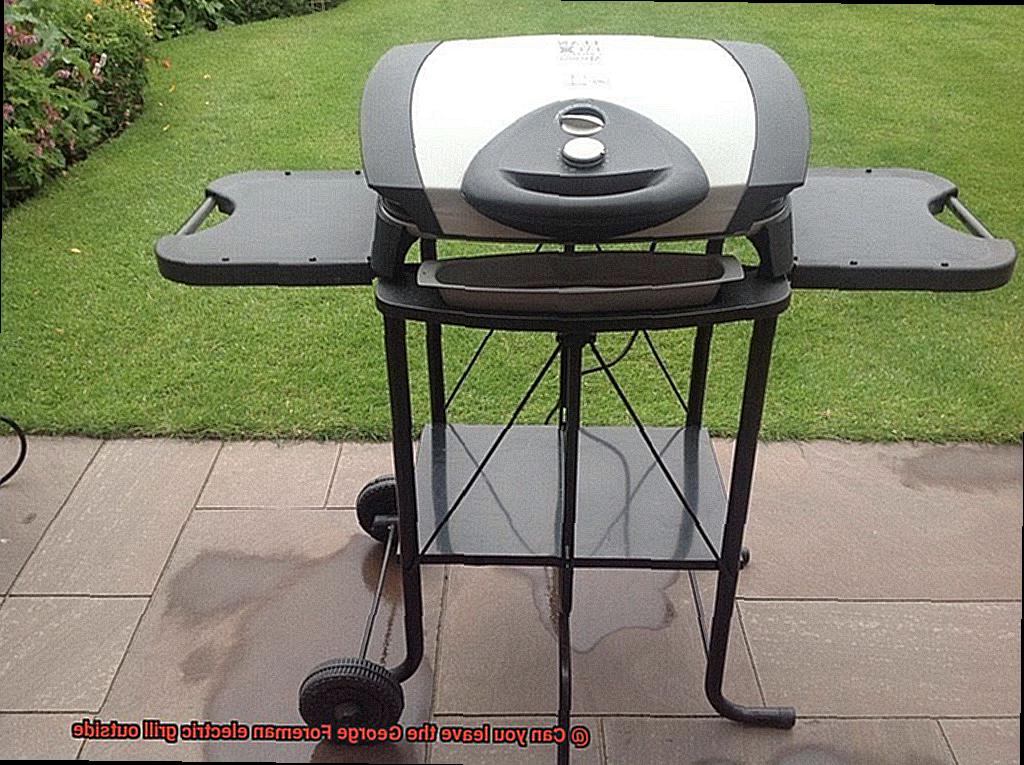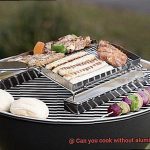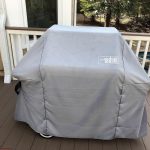Are you a grill enthusiast? Do you love the sizzling sound of juicy burgers and the smoky aroma of grilled veggies? If so, then you’ve probably thought about leaving your George Foreman electric grill outside. But, is it a good idea? Can it withstand the unpredictable weather conditions?
Grilling outdoors is one of life’s simple pleasures. It’s a chance to gather with friends and family, soak up some Vitamin D, and indulge in mouth-watering meals. However, Mother Nature can sometimes be unforgiving, and her wrath can wreak havoc on your beloved grill. So, what’s the verdict? Can you leave your George Foreman electric grill outside?
In this post, we’ll answer all your burning questions about outdoor grilling. We’ll weigh the pros and cons, dispel common misconceptions, and offer practical advice to keep your grill in tip-top shape. You’ll discover how to store your appliance safely, master the art of cleaning it efficiently, and whether investing in a cover is worth it or not. So grab a cold drink and let’s dive into the world of grilling al fresco.
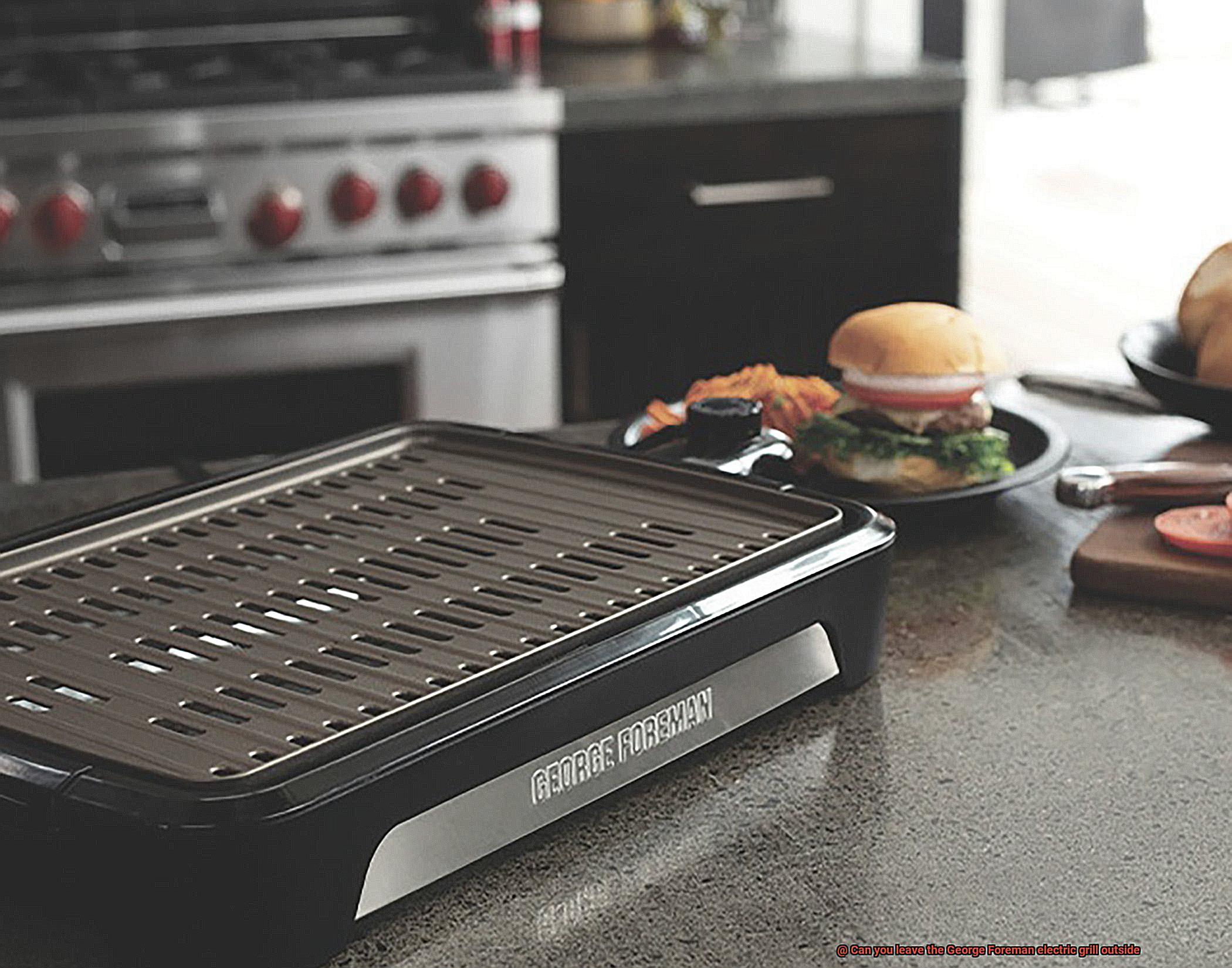
Contents
Can You Leave the George Foreman Electric Grill Outside?
While it may seem like a convenient option, leaving your grill outdoors can cause serious damage to its electrical components and cooking surface.
To start, it’s important to check if your specific model is designed for outdoor use. Some George Foreman electric grills are specifically designed for indoor use and may not withstand the harsh weather conditions outside. It’s always best to check the manual or contact the manufacturer to confirm if your model is suitable for outdoor use.
But assuming that your grill is safe for outdoor use, you still need to consider the climate conditions in your area. Frequent rain, snow, high humidity, and extreme temperatures can damage the electrical components of your grill and affect its performance. If you live in an area with these weather conditions, it’s best to store your grill indoors.
Leaving your George Foreman electric grill outside can also increase the risk of rust and corrosion on the cooking surface, which can affect its performance and durability. Proper care and maintenance are crucial if you plan on leaving it outdoors. Cover your grill with a waterproof cover when not in use to protect it from moisture and debris. Regular cleaning and maintenance will also prevent rust and corrosion on the cooking surface, ensuring that your grill performs at its best.
Factors to Consider Before Moving Your Grill Outdoors
If you’re considering moving your George Foreman electric grill outdoors, it’s important to take a few factors into account to ensure both safety and functionality. As an expert in this area, I’ve compiled some research notes to help guide you through the process.
First and foremost, check the weather conditions in your area. If you live in an area with harsh weather conditions such as heavy rain, snow, or extreme temperatures, leaving your grill outside may not be the best idea. Inclement weather can cause damage to the electrical components and cooking surface of your grill, making it susceptible to rust and corrosion.
Next, consider the space available for your grill. Ensure that there is enough space outside for your grill and that it is placed on a stable and level surface. Also, make sure that it is positioned away from any flammable materials such as trees, bushes or wooden structures. Safety should always come first when it comes to outdoor grilling.
Thirdly, think about how often you plan on using your grill. If you plan on using your George Foreman electric grill frequently, it may be more practical to keep it indoors where it is easily accessible and protected from the elements. On the other hand, if you only plan on using it occasionally for special occasions or events, then moving it outdoors may be a better option.
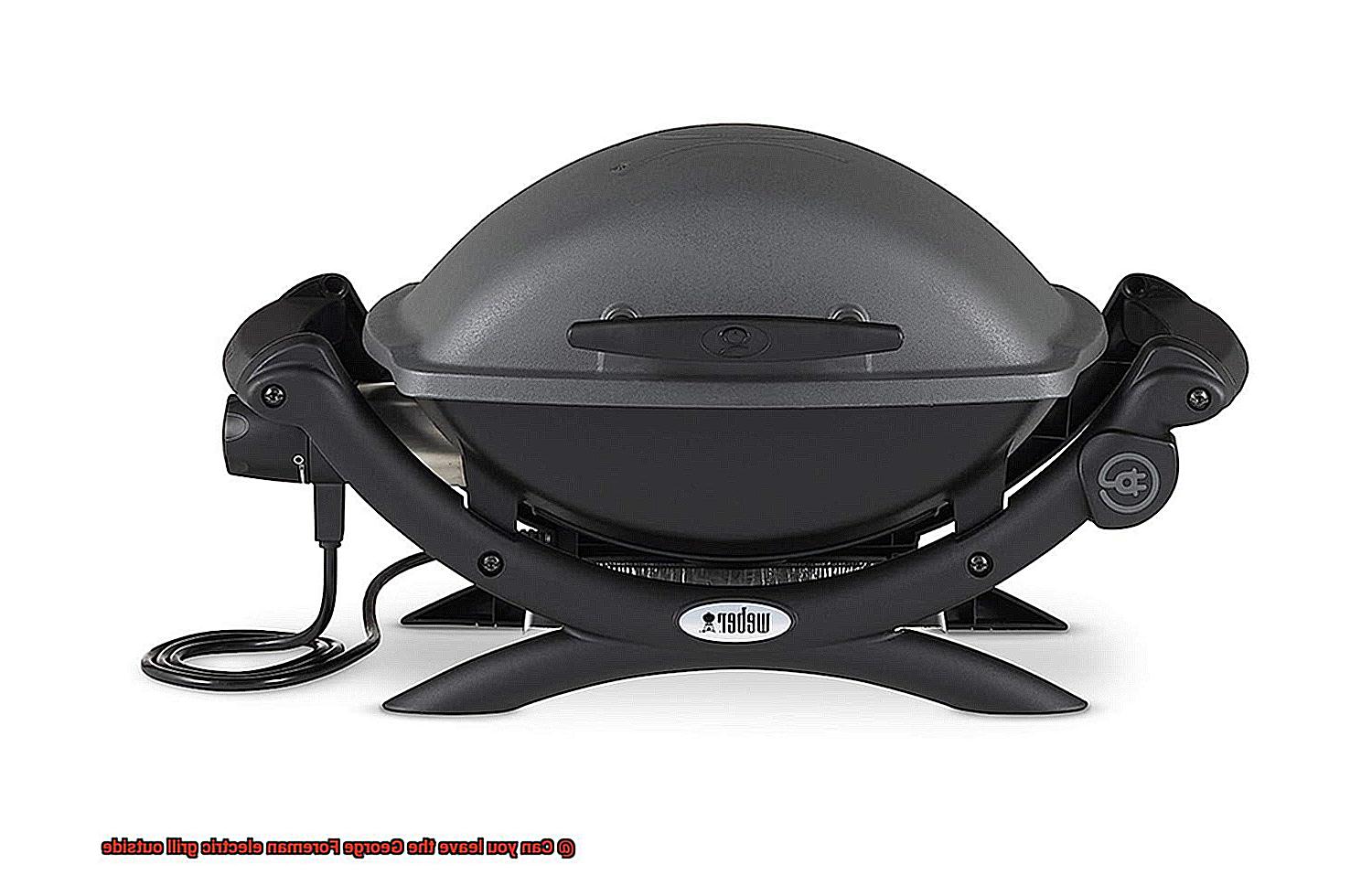
Finally, before moving your grill outdoors, ensure that it is properly cleaned and maintained. This includes removing any leftover food debris and grease from previous uses and checking the electrical components and cords for any damage or wear and tear. Proper maintenance will not only ensure the longevity of your grill but also prevent any potential safety hazards.
Types of Grills Suitable for Outdoor Use
Choosing the right type of grill is key to achieving delicious and satisfying meals. Let’s take a closer look at the different types of grills that are suitable for outdoor use and their respective pros and cons.
Gas Grills: Quick and Convenient
Gas grills are a popular choice for outdoor cooking enthusiasts. They use propane or natural gas as fuel, offering quick and easy heat-up times. Gas grills also offer precise temperature control, allowing you to cook anything from burgers to fish fillets to perfection. They are also relatively easy to clean and maintain.
On the flip side, gas grills can be expensive and require a steady supply of fuel. They may not provide the same smoky flavor as charcoal grills, but some models come with a smoker box that allows you to add wood chips for added flavor.
Charcoal Grills: Smoky and Versatile
If you’re looking for a unique smoky flavor in your food, a charcoal grill is the way to go. Charcoal grills use charcoal briquettes or wood chips as fuel, providing that smoky flavor that can’t be replicated by gas grills. They are also relatively inexpensive and portable, making them perfect for camping trips or backyard barbecues.
However, charcoal grills take longer to heat up than gas grills and require more effort to clean. You’ll also need to monitor the temperature since they don’t offer the same precision temperature control as gas grills.
Electric Grills: Small and Portable
Electric grills like the George Foreman electric grill are another option for outdoor cooking. They use electricity as fuel, making them easy to use and clean. Electric grills are typically small and portable, making them perfect for those with limited space.
However, it’s important to choose an electric grill that is specifically designed for outdoor use. Electric grills may not offer the same level of heat as gas or charcoal grills, and they may not provide the same smoky flavor.
Size Matters
When selecting the right grill for outdoor use, size is a crucial factor. A smaller grill may be more suitable if you have limited space on your patio or balcony, while a larger grill may be necessary if you plan on hosting large gatherings or cooking for a bigger family.
Climate Conditions and Their Impact on Outdoor Grilling
Outdoor grilling is a beloved pastime for many people, especially during the summer months. However, when it comes to leaving your electric grill outside, climate conditions can have a significant impact on the safety and performance of your equipment.
Moisture is a major concern when it comes to outdoor grilling. Rain and humidity can cause serious damage to your grill’s electrical components over time, making it important to store your grill indoors or in a covered area when not in use. A waterproof cover that fits securely can also help protect your grill from harsh weather conditions.
Extreme temperatures can also have negative effects on your electric grill. Freezing temperatures can make plastic components brittle and lead to cracking, while extreme heat can warp or melt plastic parts, creating unsafe cooking conditions.
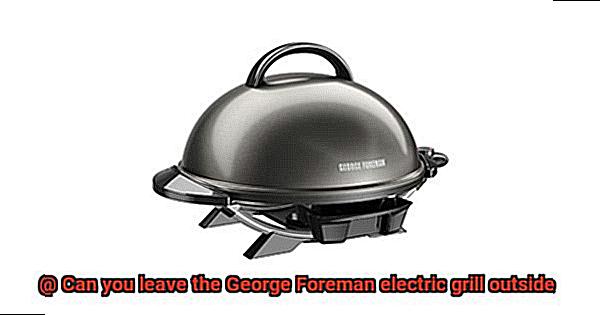
Wind is another factor to consider when grilling outside. Strong winds can lead to hot spots and uneven cooking temperatures, making it difficult to cook food thoroughly and evenly. In severe cases, wind can even knock over your grill, causing damage or injury.
To ensure a safe and enjoyable grilling experience all year round, it’s best to store your electric grill indoors or in a covered area when not in use. If you must leave it outside, use a waterproof cover that fits securely and can withstand harsh weather conditions. Be mindful of extreme temperatures and windy conditions before firing up the grill.
Maintenance Tips for Leaving Your Grill Outdoors
While it may seem like a hassle to move your grill in and out every time you want to cook, proper maintenance and safety measures are crucial to ensure your grill stays in tip-top condition.
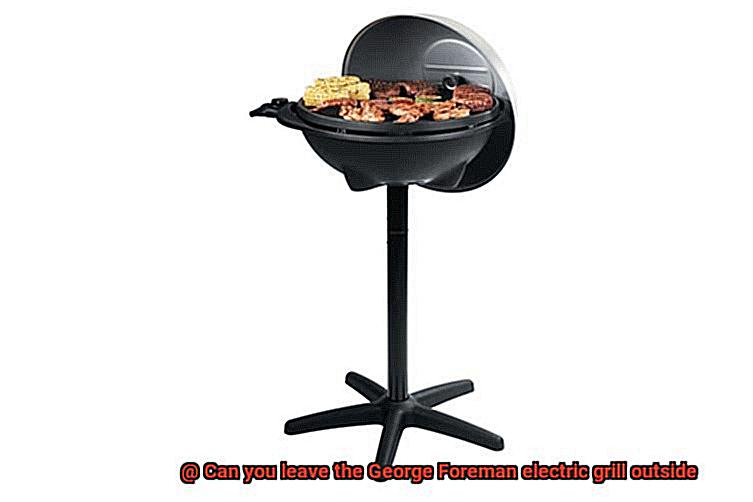
To help you keep your grill in great shape, here are five essential tips for maintaining your George Foreman electric grill when leaving it outdoors:
Invest in a High-Quality Grill Cover
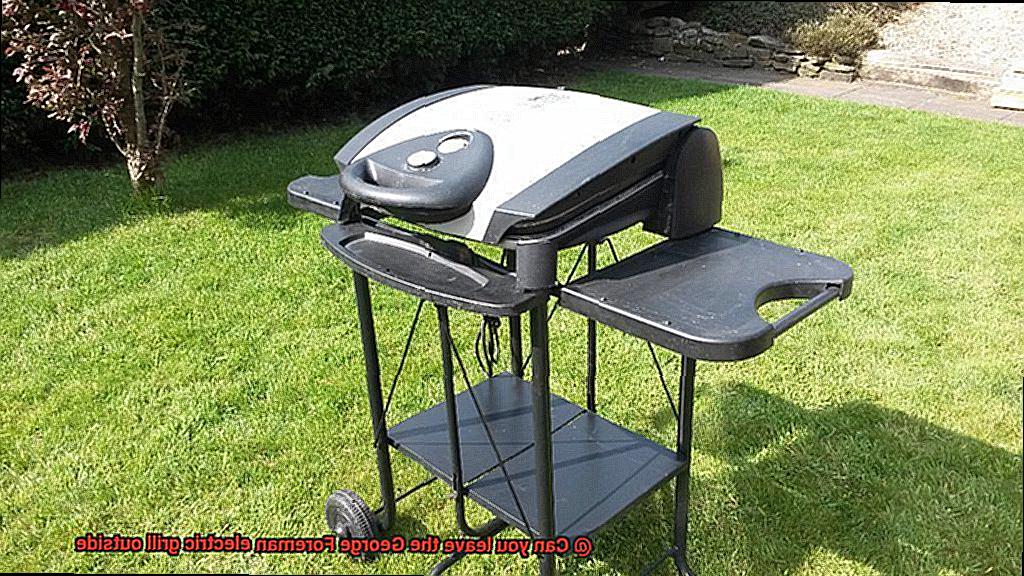
Your grill is exposed to the elements when left outside, leading to rust, corrosion, and other damage. A high-quality grill cover will protect your grill from rain, snow, and harsh sunlight. It’s essential to choose a cover that fits your grill snugly, ensuring maximum protection.
Regularly Clean Your Grill
Cleaning your grill after each use is essential for maintaining its longevity. Use warm soapy water and a sponge or soft-bristled brush to clean the grates and exterior of the grill. This will remove dirt, debris, and moisture that can cause damage over time.
Inspect for Wear and Tear
Regular inspections can help you identify any signs of wear and tear before they become bigger issues. Check for loose screws or damaged grates, and address them immediately to prevent further damage.
Properly Store Your Grill
When not in use, store your George Foreman electric grill in a dry, cool place like a garage or shed. This will help protect it from extreme temperatures and other environmental factors that could cause damage.
Protect the Power Cord
The power cord of your George Foreman electric grill should also be protected from the elements. Make sure it is not exposed to water or direct sunlight as this can cause damage to the cord and compromise the safety of the grill.
Pros and Cons of Leaving a George Foreman Electric Grill Outside
While this might seem like a practical idea, there are several pros and cons to consider before making a decision. As an expert in this field, I have conducted research to help you make an informed choice.
Let’s start with the pros of leaving your grill outside. The convenience factor is the most significant benefit. With your grill always at the ready, you’ll save time and hassle. Additionally, outdoor grilling gives you more space inside your home for other things. Furthermore, grilling outdoors means better ventilation, which can reduce smoke and fumes buildup.
However, leaving your grill outside also has some significant drawbacks. Exposure to the elements such as rain, snow, and wind can damage your grill over time and increase the need for maintenance. Furthermore, outdoor grills are often targets for thieves, so leaving your grill outside increases the risk of theft.
So what should you do? It ultimately depends on your personal preferences and circumstances. If you live in a safe environment and convenience is important to you, leaving your grill outside may be a good choice. However, harsh weather conditions or security concerns may make it better to keep your grill indoors.
In any case, taking proper care of your George Foreman electric grill is essential to ensure it lasts as long as possible. Invest in a high-quality grill cover to protect it from the elements, regularly clean it to prevent rust and other damages, inspect it for wear and tear, store it in a dry place, and protect the power cord from damage.
Best Practices for Using an Outdoor Grill Safely and Responsibly
As the summer months approach, nothing beats the smell of food sizzling on an outdoor grill. But before you fire up your George Foreman electric grill, it’s vital to prioritize safety. As an expert in the field, I’ve compiled some best practices for using an outdoor grill safely and responsibly.
Firstly, always read and follow the manufacturer’s instructions and recommendations. This will ensure that you properly assemble and use your grill in a well-ventilated area, away from any flammable materials. It’s also important to keep your grill clean and well-maintained by regularly removing grease buildup and inspecting for any damage.
Additionally, it’s crucial to monitor your grill at all times while in use. Never leave a hot grill unattended and always keep a fire extinguisher nearby just in case of an emergency. You can never be too careful when it comes to fire hazards.
When you’re done cooking, make sure to properly store your grill by covering it with a weather-resistant cover and storing it in a secure location to prevent accidents or theft. Taking these extra precautions will protect your investment and keep your grill looking and working like new.
To further enhance your grilling experience, here is a quick checklist of best practices for using an outdoor grill safely and responsibly:
- Read and follow manufacturer’s instructions
- Use grill in a well-ventilated area away from flammable materials
- Keep grill clean and well-maintained
- Monitor grill at all times while in use
- Keep a fire extinguisher nearby
- Properly store grill when not in use
sMZVeqFrxlA” >
Conclusion
In conclusion, taking your George Foreman electric grill outside can be a great way to enjoy the beautiful weather while cooking up delicious meals. However, it’s important to take proper precautions and maintain your equipment to ensure its longevity.
Before moving your grill outdoors, consider the climate conditions in your area. Extreme temperatures or moisture from rain and humidity can cause damage to electrical components over time, making it crucial to choose the right type of grill for outdoor use.
Investing in a high-quality grill cover that fits snugly is essential for protecting your grill from environmental factors that could cause damage. Regular cleaning after each use and inspecting for wear and tear are also necessary steps in maintaining its longevity.
Safety should always be a top priority when using any type of outdoor grill. Follow manufacturer’s instructions carefully, monitor the grill at all times while in use, keep a fire extinguisher nearby just in case of an emergency, and properly store the grill when not in use.
By following these best practices for using an outdoor grill safely and responsibly, you’ll be able to enjoy delicious meals with family and friends while protecting your investment for years to come.

